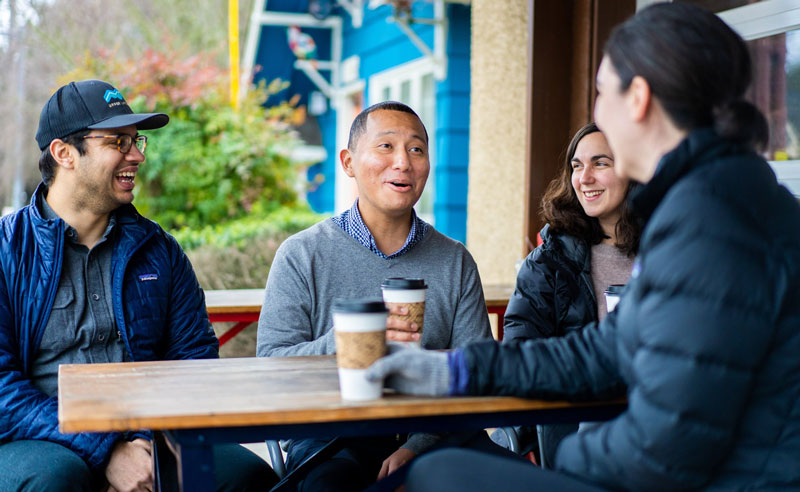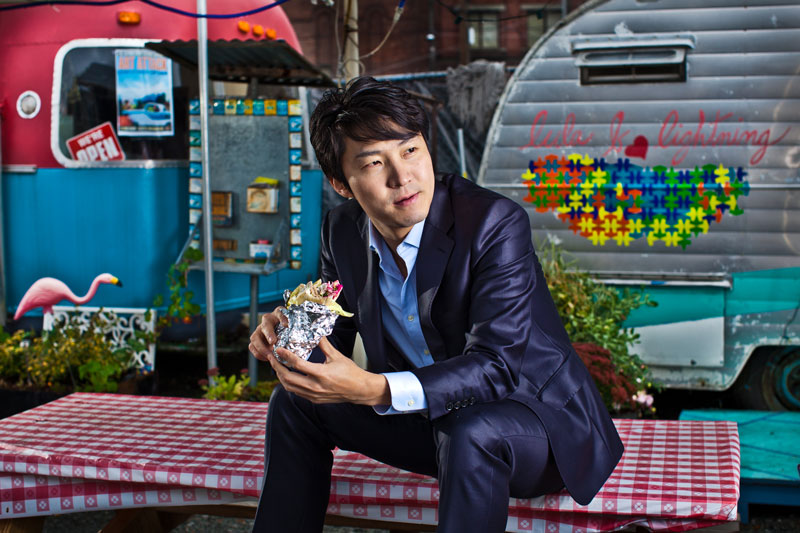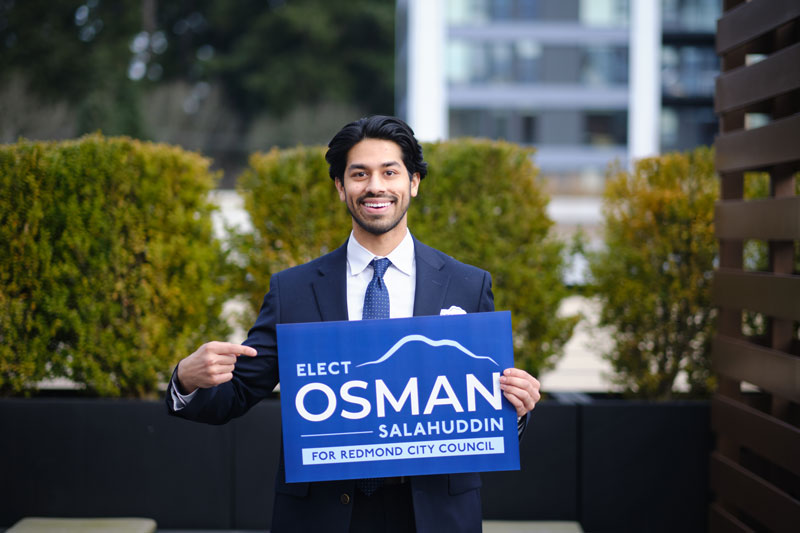Changemakers: Then and now Changemakers: Then and now Changemakers: Then and now
This fall, Viewpoint reaches 20 years of telling stories about people who make a difference. Find out how those people have impacted their communities.
By Shin Yu Pai | Viewpoint Magazine
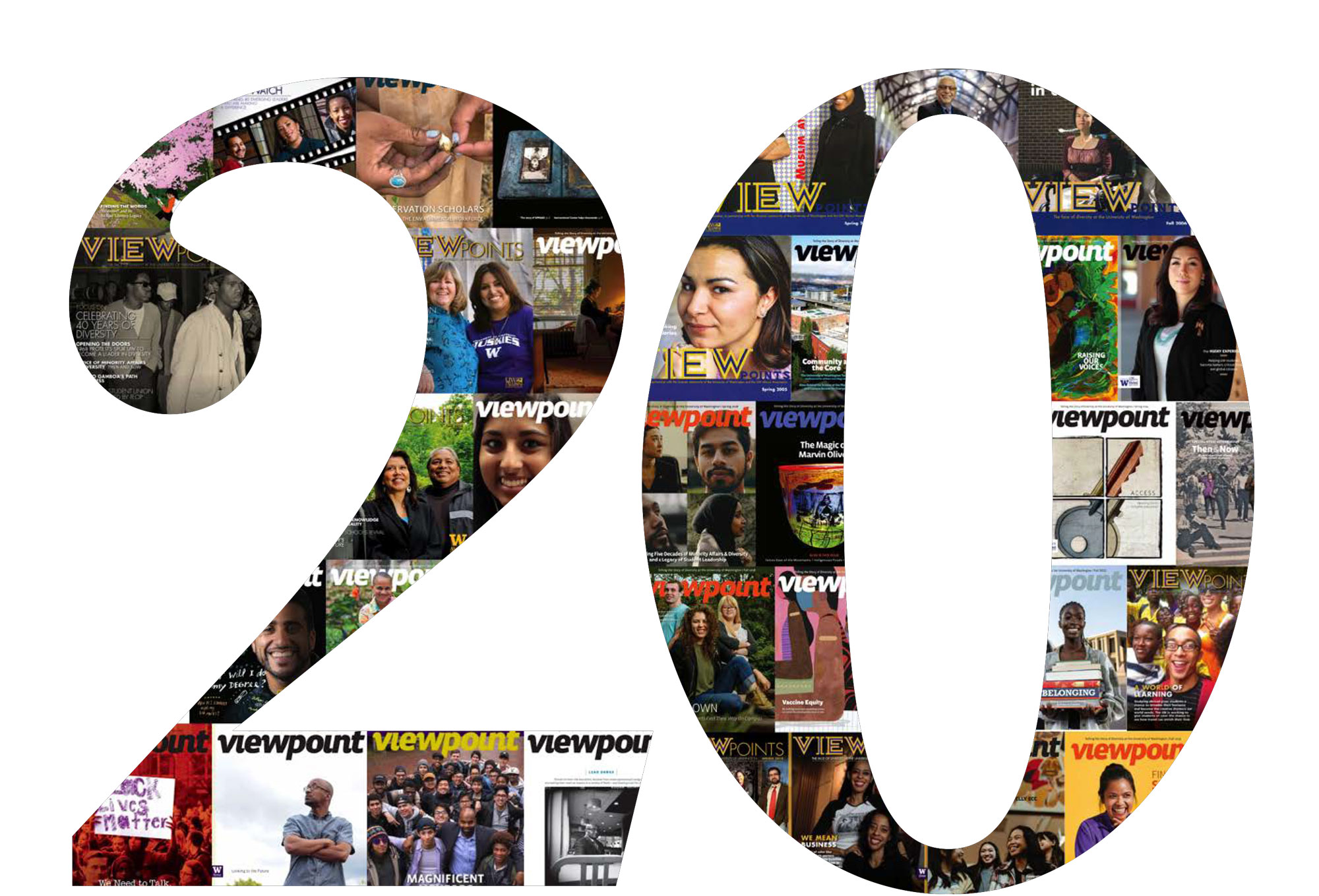
In this complex and vibrant world, the University of Washington can boast a remarkable group of alumni who embody the spirit of innovation and social good. From championing human rights to leading businesses and protecting human health, 20 alumni who appeared in the pages of Viewpoint over the last two decades are presented here. We met them as students, as aspiring professionals and as community leaders in-the-making. Now, as this publication reaches a new landmark, we dig back into their stories and celebrate them for using their talents and experiences to create change across the globe and here at home.
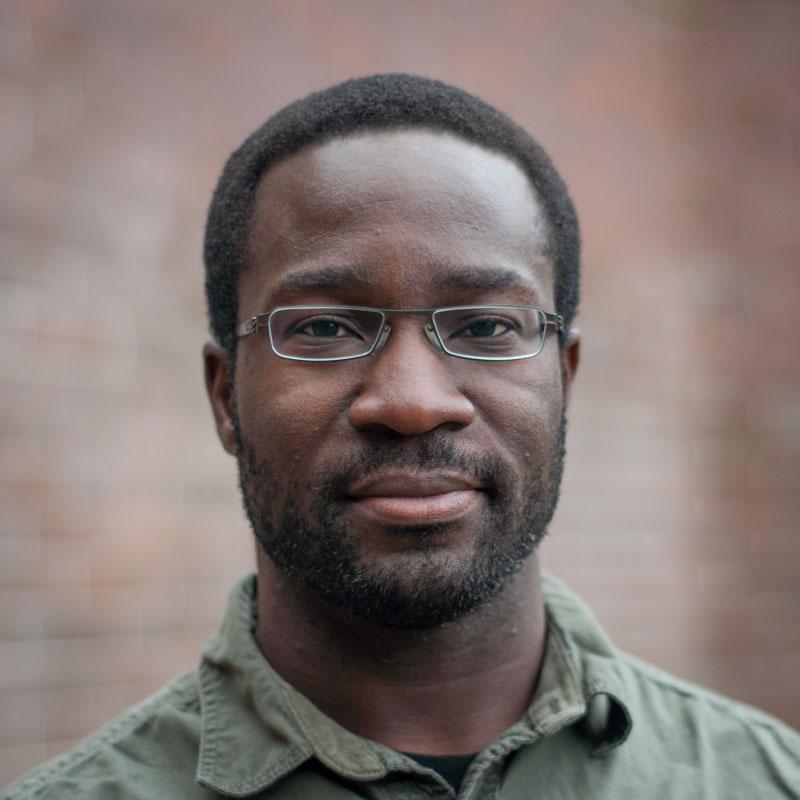 1. Yaw Anokwa, ’07, ’12
1. Yaw Anokwa, ’07, ’12
A “wandering do-gooder,” Yaw Anokwa wanted to work on solving meaningful problems. After completing his master’s in computer science and volunteering for six months in Rwanda, he returned to the UW for his doctoral degree in computer science and embarked on launching ODK (originally Open Data Kit), an open-source software designed to help social-impact organizations collect data offline in low-resource settings.
Today: Anokwa, and his business partner, Hélène Martin, ’08, lead ODK in its mission to help researchers, field teams and other professionals collect the data they need to power decision-making in public health, global development, crisis response and more. The platform is now used in 190 countries by more than two million people. ODK’s impact on public health is particularly notable: The World Health Organization has used the software to help immunize hundreds of millions of children and cites ODK as a key technology that helped eradicate wild polio from Africa.
2. Kyle Rapiñan, ’12
Kyle Rapiñan credited Seattle Education Access with helping them navigate the administrative challenges of applying to UW as a formerly homeless high school senior. While a UW student, Rapiñan helped establish the youth-led arts venue Queer Youth Space on Capitol Hill and was closely involved with the Q Center on campus.
Today: Rapiñan, who studied law at Northeastern University, works as an assistant attorney general for the New York State Attorney General’s civil rights bureau. They focus on LGBTQ+ rights, disability rights and housing justice work. Before that, Rapiñan was at the NYC Commission on Human Rights working on discrimination-related cases and ran their own law practice, helping adults and minors change their names and update their various identification documents. They were also the director of survival and self-determination at the Sylvia Rivera Law Project, working alongside low-income transgender and gender non-conforming people of color for gender self-determination and liberation.
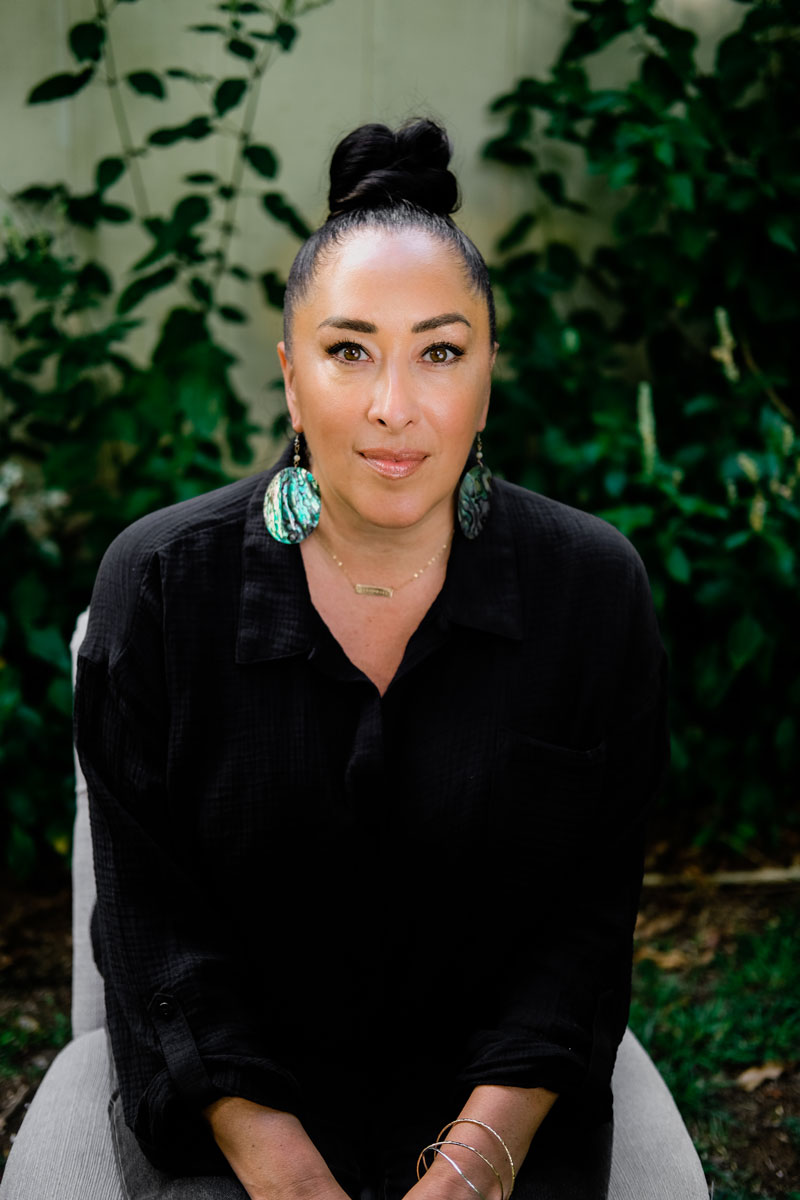 3. Lael Echo-Hawk, ’99, ’03
3. Lael Echo-Hawk, ’99, ’03
One of the “40 to Watch” emerging leaders profiled in the spring, 2009 issue of Viewpoint, Lael Echo-Hawk stood out for her work as in-house counsel for the Tulalip Tribes and for her leadership on the Washington Bar Association Committee for Diversity. She moved to Washington, D.C., in 2010 to take a position as legislative director for the Native American Contractors Association and then as counselor to the chairwoman of the National Indian Gaming Commission. She served as past president of both the National Native American Bar Association and the Northwest Indian Bar Association.
Today: Based in Washington, D.C., Echo-Hawk returned to private practice in 2018 and leads the tribal advocacy group MThirtySix, Inc., where she advises tribes from Alaska to Massachusetts. “As a young person watching my grandma Katie John’s legal fight to fish at the village site where she was born, I knew that the law was a place that needed more Native voices,” she says. “I’m blessed to be trusted by my clients to advocate on their behalf and in that role, I can help bring very practical and real change to my community.”
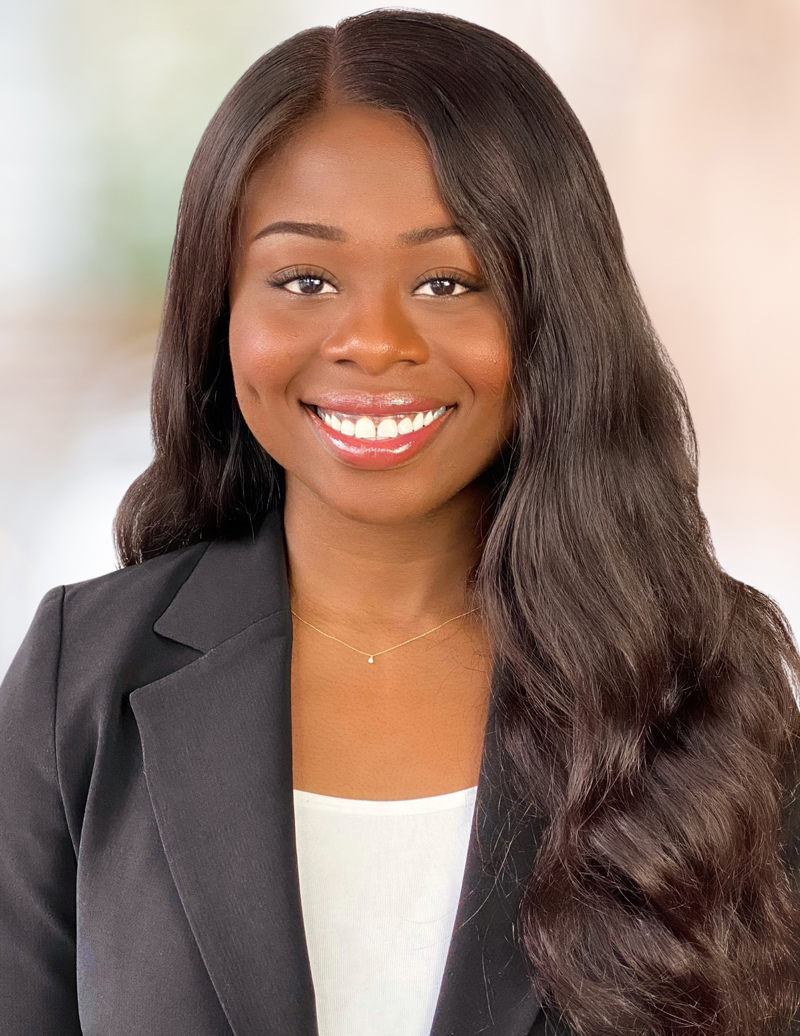 4. Dorender Gray, ’14, ’22
4. Dorender Gray, ’14, ’22
A first-generation college student, Dorender Gray, ’14, ’22, said the support she received as a Husky Promise student and from the UW’s Instructional Center was critical in her success. She graduated with a major in neurobiology and a minor in global health. She took three gap years to work on the development of malaria vaccines at the Center for Infectious Disease Research while working part time as a medical scribe. During that time, she applied and was accepted to the UW School of Medicine.
Today: Gray is now a resident physician in the UW OB/GYN Residency Program. She chose her specialty after seeing the profound impact she could have on her community. “There is a significant shortage of Black OB/GYN physicians, leaving many Black and underserved patients without providers they can identify with,” Gray says. “My OB/GYN rotation was the only one where I felt heartbroken when the day came to an end. I wanted to rewind the clock and spend more time engaging with patients and experiencing the breadth of care OB/GYNs provide.” Gray manages her patients’ pregnancies, addresses their health concerns and performs surgeries that offer definitive treatment for conditions they have struggled with for years. “It’s especially rewarding when my Black patients light up upon seeing me, often because they’ve never had a Black OB/GYN before. The instant connection and the words of affirmation they offer is energizing and encourages me to keep pushing forward. I absolutely love my job!”
5. Abel Pacheco Jr., ’12
When Abel Pacheco Jr. moved from Southern California to attend graduate school in public affairs, he packed his car and kissed his parents goodbye, promising them that he would make them proud. At the UW, Pacheco found mentors who helped him to navigate his career while being a part of the Graduate Opportunities and Minority Achievement Program community. His GO-MAP cohort supported him through graduate school, which shaped how he approaches his work with organizations.
Today: While working in the Office of Minority Affairs & Diversity, Pacheco was appointed to fill a vacant position as the District 4 representative on the Seattle City Council in 2019. There he served as chair of the land use committee and vice-chair of the Transportation & Sustainability Committee. He later became the director of government & community relations for the central corridor at Sound Transit. In June 2023, he joined the Washington State Army National Guard to serve part time as an intelligence analyst. Pacheco’s dad was killed in a car accident earlier this year. “The UW helped me honor my promise to my parents, and it’s an experience that I am grateful for,” he says. “The UW helped me give him such a happy and proud heart.”
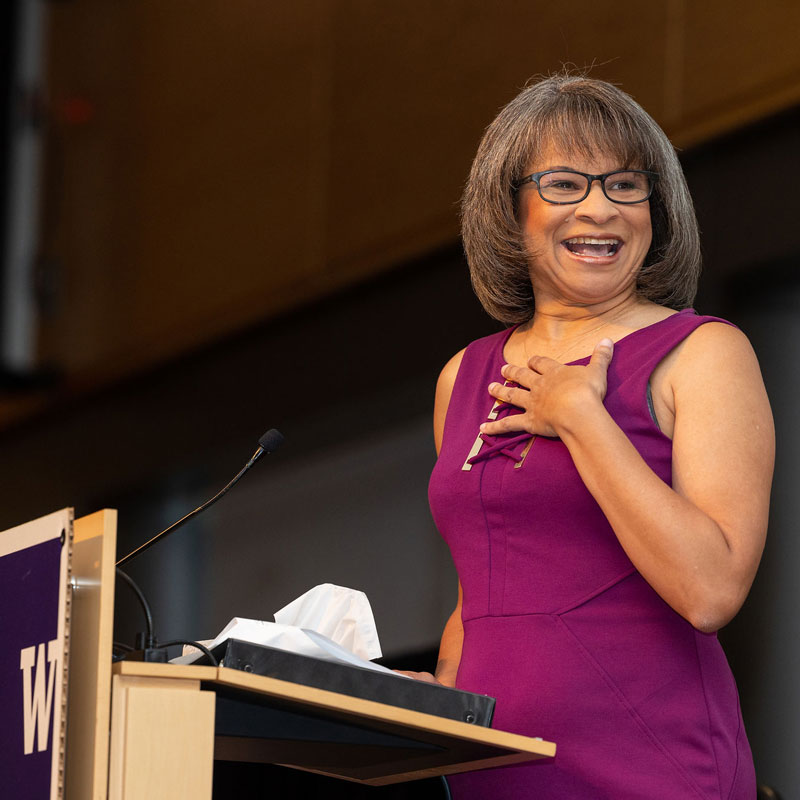 5. Angela King, ’94
5. Angela King, ’94
As an undergraduate, Angela King went after every internship and became a dedicated member of the Associated Student Journalists of Color while also tutoring high school students through the Central Area Youth Association. Between going to classes and raising her young son, King spent her remaining time in the editing booths at the Communications Building. She received a number of academic awards, but she says her most cherished achievement was the FEOP/OMA&D President’s Achievement Award, which is given to one of the top-performing students in the Educational Opportunity Program.
Today: King worked as a writer, reporter and anchor for KING-5 and FOX 13 Seattle. She was a member of the team that launched the now defunct Northwest Cable News Network until 2017. “I was there when we switched the lights on, and I was the last one to turn them off,” King says. She left TV news to pursue a dream of producing documentaries. One project took her to Moldova. Upon her return, the news industry beckoned her back to the anchor desk. “A former news director called to say KUOW 94.9 FM was looking for a new morning show host. I thought, ‘Why not? It can’t hurt to apply,’ ” she says. “I was totally shocked, though, when KUOW offered me the job.” King became the local host of NPR’s “Morning Edition” in 2018. The Emmy Award-winning journalist is now celebrating 30 years in the news business. She has also hosted the UW Commencement Ceremony’s pre-show (The Purple Carpet) for the past three years and is a regular at OMA&D’s Celebration. “It’s so amazing to come home on so many levels, and still be active with the University that set me on my professional path,” she says.
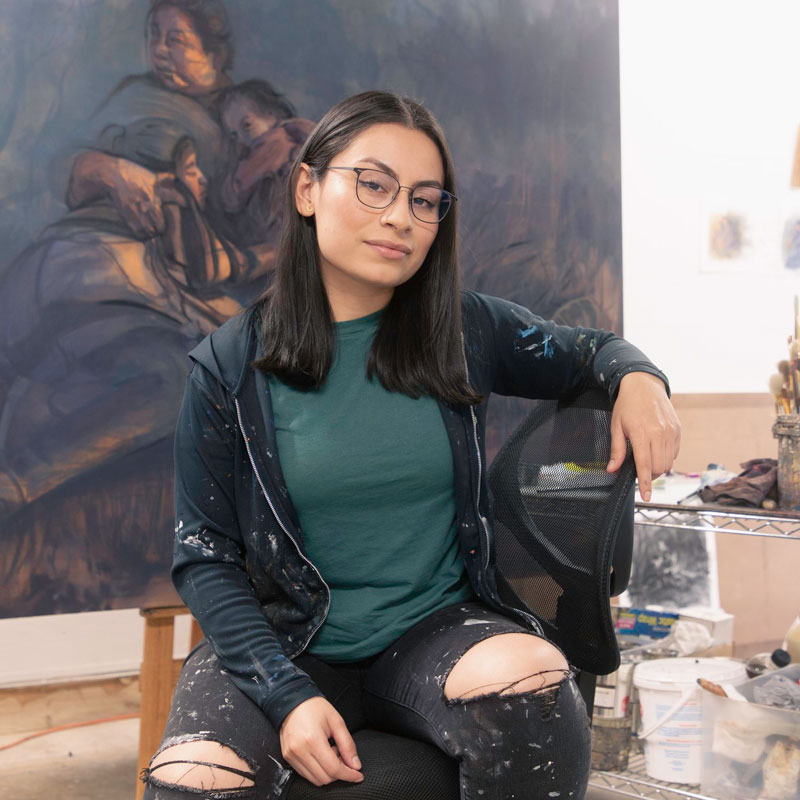 7. Arely Morales, ’17
7. Arely Morales, ’17
Arely Morales dazzled museumgoers at the Henry Art Gallery with her MFA thesis show, which featured large-scale portraits of immigrant workers from Mexico and Central America. She graduated with honors from the School of Art + Art History + Design, with the additional distinction of the department’s de Cillia Graduating With Excellence Award.
Today: After graduation, Morales found a teaching position at Stephen F. Austin State University in Nacogdoches, Texas. She also received a 2019 Elizabeth Greenshields Foundation Grant for her artwork. She has been featured in numerous group and solo exhibitions at institutions including the Art League Houston, the Masur Museum of Art, the National Museum of Mexican Art in Chicago and the U.S. Embassy in Mexico City. Her work is held in public collections, including the Dallas Museum of Art. In April 2024, Morales’ work was selected for the exhibit “New Worlds: Women to Watch” at the National Museum of Women in the Arts in Washington, D.C.
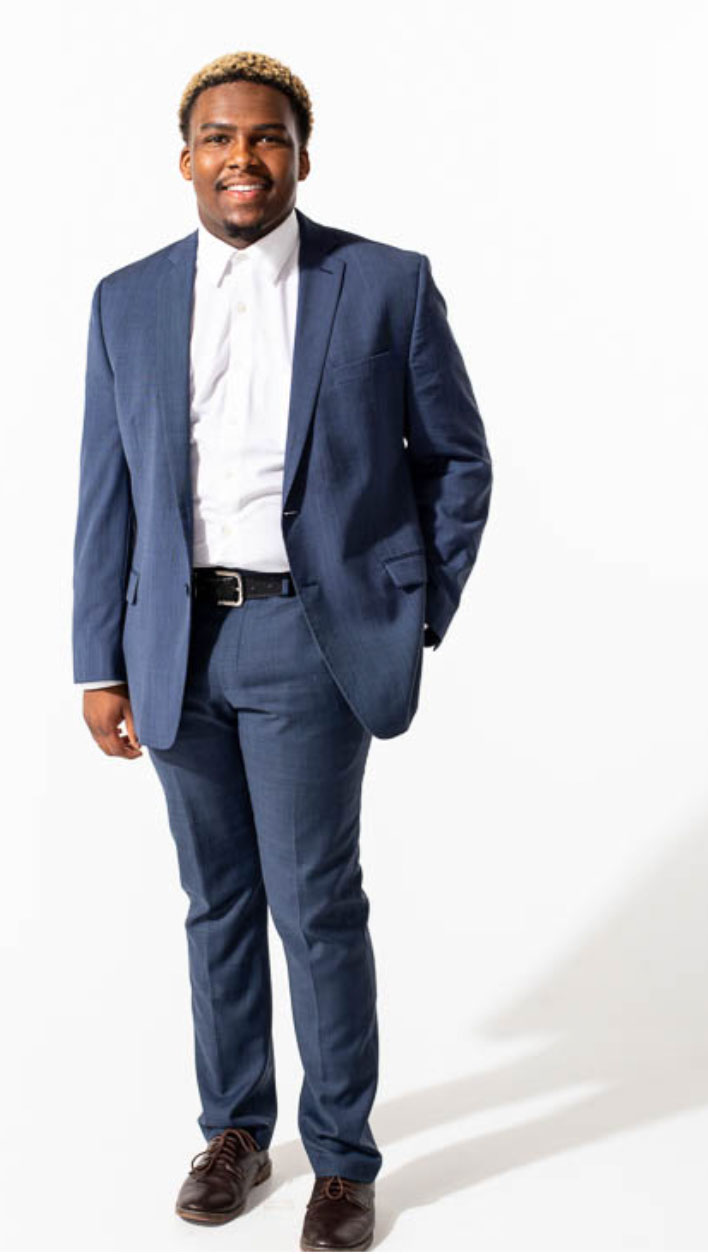 8. Navon Morgan, ’23
8. Navon Morgan, ’23
In fall 2020, Navon Morgan brought a student’s perspective to a special issue of Viewpoint highlighting the voices of Black people from the UW community in the wake of George Floyd’s murder and in the midst of the Black Lives Matter movement. As a student and director of the ASUW’s Black Student Commission, Morgan underscored experiences many Black students face, like not feeling safe on campus, and saw ways the University could better meet the needs of Black and Indigenous students. He also urged the UW community to renounce white supremacy and do better with efforts like removing harmful symbols, increasing the number of Black faculty and staff, and supporting students in their efforts to effect change. “Though we recognize our first job is to be students, choosing between classwork and fighting for those we care about is neither an easy nor a fair choice,” he wrote.
Today: As a UW student, Morgan continued as a leader and advocate while supporting the work of the Disability Resources Center. “I was able to broaden my lens on the issues impacting people living with disabilities and work to attain an education at UW,” he writes. “These opportunities showed me that the gaps in access and resources were more vast and structural than I’d imagined when I was a sophomore writing for Viewpoint.” He was one of the Husky 100 (recognized for making the most of his time at the UW), served on the provost’s advisory board and chaired the group that planned the Black Graduation ceremony in 2023. After graduating with honors in political science, Morgan helped pilot an after-school youth leadership program at his alma mater, Fort Vancouver High School. This fall, he started work on his master’s in public affairs at Cornell University on a full-tuition scholarship.
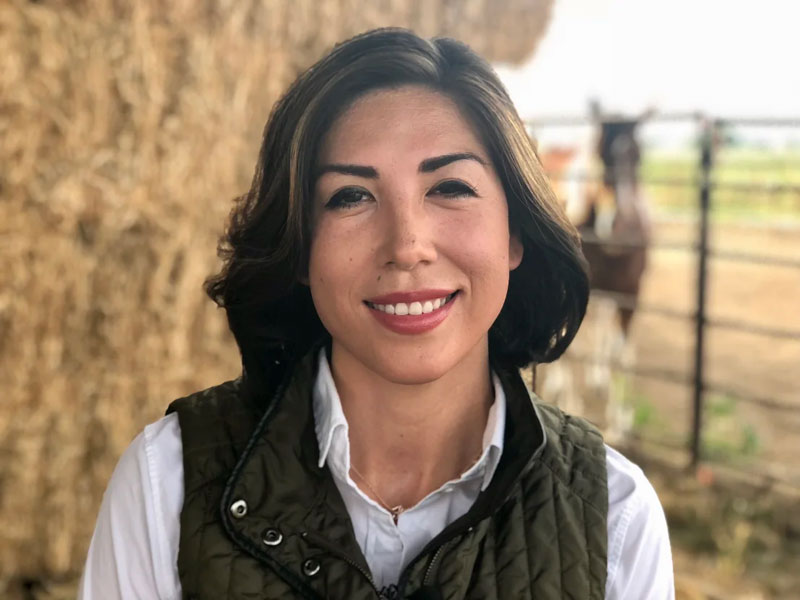 9. Paulette Jordan, ’03
9. Paulette Jordan, ’03
As a student, Paulette Jordan worked with University administrators and the Office of Minority Affairs & Diversity to bring the Spring Powwow back to the UW. She was one of the emerging leaders featured in the spring 2009 Viewpoint story “40 to Watch” and was highlighted for her work with Idaho Young Democrats and the National Young Democrats convention.
Today: After graduation, Jordan moved home to Idaho and became the youngest person elected to the Coeur D’Alene Tribal Council. She served as a state representative for Idaho from 2014 to 2018. She is a recipient of the National Center for American Indian Enterprise Development Business Leadership Award as one of the “Top 40 under 40” and speaks nationally on economic and community leadership. She ran for governor in Idaho—a state that has never elected a woman governor—in 2018 and for the U.S. Senate in 2020. She is also the subject of “Paulette,” a short documentary about her historic run as the first Native American to win Idaho’s primary for governor.
10. James Sun, ’99
James Sun started his technology investment company with $5,000 at age 18. By the time he graduated cum laude from the UW’s Foster School of Business, he had more than $2 million in the bank. In 2008, when he was featured in Viewpoint, he had founded the networking site Zoodango.com and had competed in season six of “The Apprentice.”
Today: Sun is the founder and owner of several successful ventures including Beautytap.com, Growthcare.io, Devblock.net and Dramabeans.com, the largest English-language online fan community for Korean dramas. His media presence includes hosting the TV series “Sun Tzu: War on Business,” which first aired in 2010 on BBC Worldwide and later in the U.S. on the National Geographic Channel. A sought-after speaker, he advises companies on topics including consumer segmentation, globalization and generational differences.
11. Bobby Ann Chien, ’09
Bobby Ann Chien volunteered with the Pipeline Project’s Alternative Spring Break program throughout her undergraduate years at the UW. The program, now known as Riverways Education Partnerships, brings UW students into rural and tribal K-12 schools around Washington to expand awareness of what the young people might do after high school. In her freshman year, Chien and her Pipeline classmates visited elementary school students in Tonasket to offer literacy and arts programming. They wrote, illustrated and bound a book during their week together.
Today: Chien received her law degree from Seattle University. After becoming a licensed attorney, she eventually pivoted away from a full-time legal practice and toward the corporate sector, where she could leverage her law degree. Currently with Microsoft, she has worked with Expedia, T-Mobile and Nordstrom, where she negotiated high-level agreements with suppliers and supported diversity and inclusion, human rights and environmental initiatives focused on ethical supply chains. She still volunteers for environmental and legal causes as time permits between her children and her freelance art practice.
12. Osman Salahuddin, ’18
Osman Salahuddin completed his degree in neurobiology while serving as student body president and having a research role at the UW Medical Center Emergency Department. “As I was studying toward a future in the health care field, I was called to service through my community. … I wanted to be a leader who stepped up to advocate for those whose voices were not often heard,” he said. As ASUW president, Salahuddin focused on mental health resources for students, lobbied for full funding for the State Need Grant and spoke to leaders in Olympia to help undocumented students gain eligibility to the College Bound Scholarship (HB1488).
Today: After graduating, Salahuddin worked in the private sector for a few years as a medical device consultant. He brought his healthcare background into his work by helping found the BIPOC Health Careers Ecosystem, a nonprofit helping underrepresented students find pathways in the health care field. More recently, Osman decided to run for city council in his hometown. “I have been fortunate to call Redmond home for nearly all my life,” he says. “I’ve gone to school in the city, gotten involved with local nonprofits and navigated the growth that the city has undergone in almost three decades. I ran for office to give back to the community that has shaped me while bringing new leadership and fresh ideas to the growing city.”
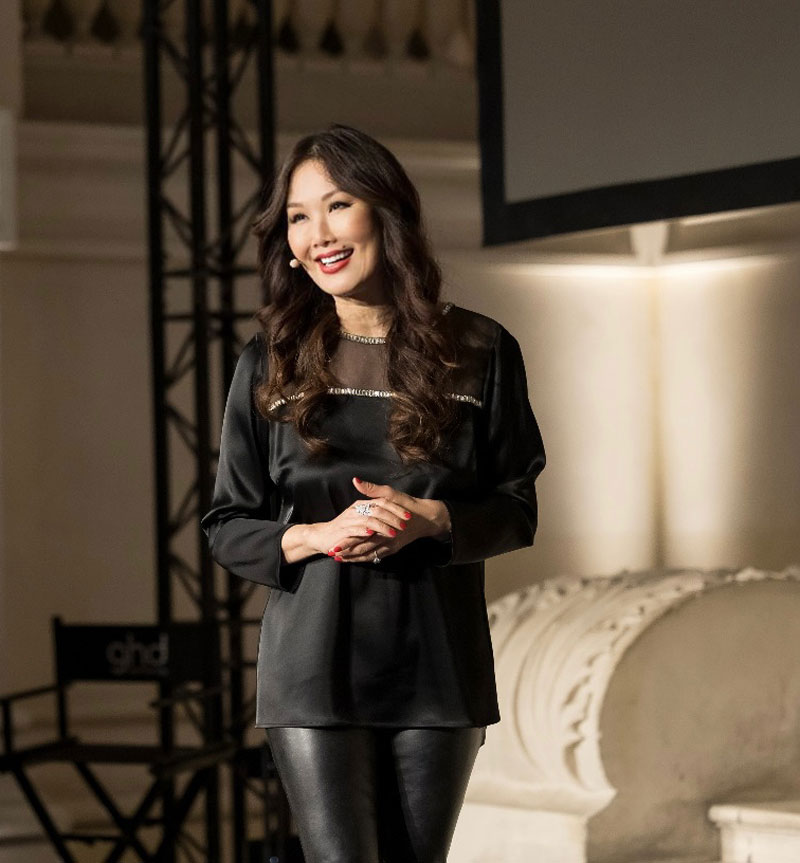 13. Annie Young-Scrivner, ’91
13. Annie Young-Scrivner, ’91
In the spring 2009 Viewpoint, Annie Young-Scrivner (described as “one of the highest-ranking women in all of PepsiCo”) had been promoted to a leadership role with Quaker Foods & Snacks. As an undergraduate, Young-Scrivner had been encouraged by Professor Judith Edwards to apply for an internship program at a Fortune 50 company. That experience led to a global career in major consumer brand companies. Her jobs have included leading marketing and sales at Quaker, global chief marketing officer and president of Tazo Tea and president of Starbucks Canada.
Today: After serving as CEO of Godiva Chocolatier from 2017 to 2020, she shifted from food and beverage to the beauty industry. She is CEO of Wella Company, a global beauty leader that operates in over 100 countries. She remains committed to UW, having served many years on the Foster School advisory board and as chair in 2018. She also attends UW events including alumni gatherings overseas. In 2017, she was the guest of honor for the China Huskies in Shanghai.
14. Kriss Turner Towner, ’84
Kriss Turner Towner moved to Los Angeles after graduating from the UW and waitressed before getting into show business as a writer for TV shows including “The Gregory Hines Show,” “Living Single” and “Sister, Sister.” She worked for several years on “The Bernie Mac Show” and sold a movie script titled “42.4 Percent,” a romantic comedy, to Focus Features.
Today: Turner Towner’s writing and producing credits have grown to include TV shows “Home Economics,” “Greenleaf,” “Everybody Hates Chris” and “Whoopi.” She has been honored for her writing with Peabody, Humanitas and NAACP awards. Her first feature film, the romantic comedy “Something New,” won a Black Filmmakers Award for best screenplay. She lives in Hollywood with her husband, daughter and three dogs.
15. Lei Ann Shiramizu, ’82
In the fall of 2011, Lei Ann Shiramizu a small business owner, shared some of her story with Viewpoint. The communications major had opened a retail shop, Momo (“peach” in Japanese), which quickly became an iconic clothing boutique in Seattle’s Chinatown-International District. She was also an advocate for preserving local history and culture and an ambassador for the historic neighborhood “People often come to the ID seeking cheap good food, but once here, I help them discover the areas other offerings,” she told us then.
Today: In 2020, after 13 years in business, Shiramizu closed Momo, ready for new endeavors. Today she taps into her business expertise and communications acumen by helping other small-business owners and managers while following her passions and spreading joy as an advocate and activist. “My recent new-found freedom allows me room for bigger travel adventures—I just returned from nearly a month exploring Spain—and smaller trips for both fun and family commitments. … I also have more time to line dance, do yoga and spend time with good friends, some of whom I met in my dorm days at the UW!”
 16. Tiffany Dufu, ’96, ’99
16. Tiffany Dufu, ’96, ’99
Viewpoint celebrated with Tiffany Dufu when she came through Seattle in 2017 to promote her book, “Drop the Ball: Achieving More by Doing Less,” a memoir loaded with advice for women on how to navigate professional expectations, family demands and pressure toward success. The book was filled with “actionable wisdom,” according to Gloria Steinem, who wrote the forward.
Today: In February, Dufu became president of the Tory Burch Foundation, a nonprofit designed to empower women entrepreneurs. She also founded The Cru, a networking platform that connects women for mentoring, coaching and goal setting. All her efforts are toward advancing women and girls, she said recently in a Women’s Wear Daily interview.
17. Benjamin Vazquez, ’02, ’07
Benjamin Vazquez was featured in 2005 for choosing to follow up his undergraduate studies in anthropology with medical school at the UW. “I stayed at the UW because there is a better commitment to primary care and community-based medicine, particularly in underserved communities,” he said. He also received a scholarship from the Multicultural Alumni Partnership.
Today: Completing his UW medical degree in 2007, he went on to intern at Virginia Mason and then do a residency at the Mayo Clinic, where he was honored with the Mayo Clinic Fellows’ Association Humanitarian Award for his outreach and volunteer work. He has served on the board for the HIV Alliance and is the past president of Lane County Medical Society (2023). As an assistant professor at Oregon Health & Science University, Vazquez teaches medical students and dermatology trainees.
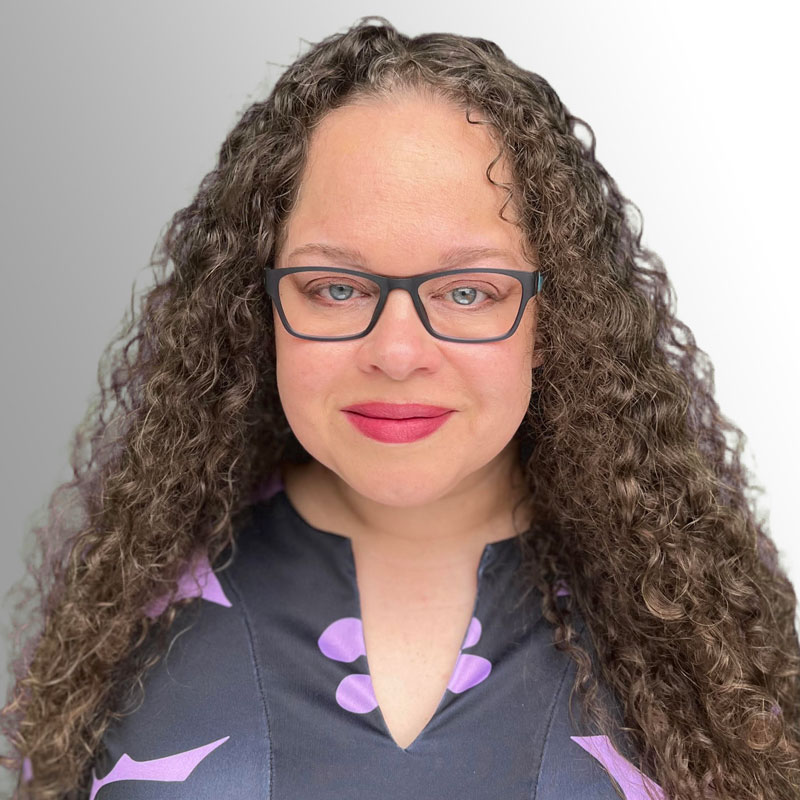 18. Phyllis Fletcher, ’11
18. Phyllis Fletcher, ’11
Phyllis Fletcher, a communication alumna, had a brief callout in Viewpoint back 2014 when she became managing editor of the Northwest News Network, a regional collaboration of public radio organizations.
Today: Fletcher has built a vibrant career around telling great stories. First a reporter, then editor and sometimes bureau chief, she has a resume that includes National Public Radio, KUOW and American Public Media Group. Recently, she served as a senior editor with The New York Times, where she developed staff and helped set editorial standards for cultural programming production. Today she’s a senior story editor for Wondery, a major podcast network and publisher. Her latest projects include “Empire City: The Untold Origin Story of the NYPD” and “Black History, for Real,” a podcast that offers an “unwhitewashed” account of overlooked history. Fletcher is also a board member for the public radio show “Live Wire,” the audio documentary organization Third Coast and is a past president of the Seattle Association of Black Journalists.
19. Roy Diaz, ’94, ’96, ’02, ’02
Roy Diaz was featured in Viewpoint’s premier issue, fall of 2004. He was highlighted as an Educational Opportunity Program alumnus and recognized for his long engagement with the UW—going from a bachelor’s degree in chemical engineering to a master’s in physical chemistry to simultaneously pursuing a law degree and a Ph.D. in biophysics.
Today: Diaz has found his niche as an intellectual property attorney and adviser. His volunteer work includes serving as trustee and past president of the UW Alumni Association, past president and board member of the UW School of Law Alumni Association and trustee for Seattle Children’s. In June, he joined the UW’s Presidential Search Advisory Committee to help the University find its next leader.
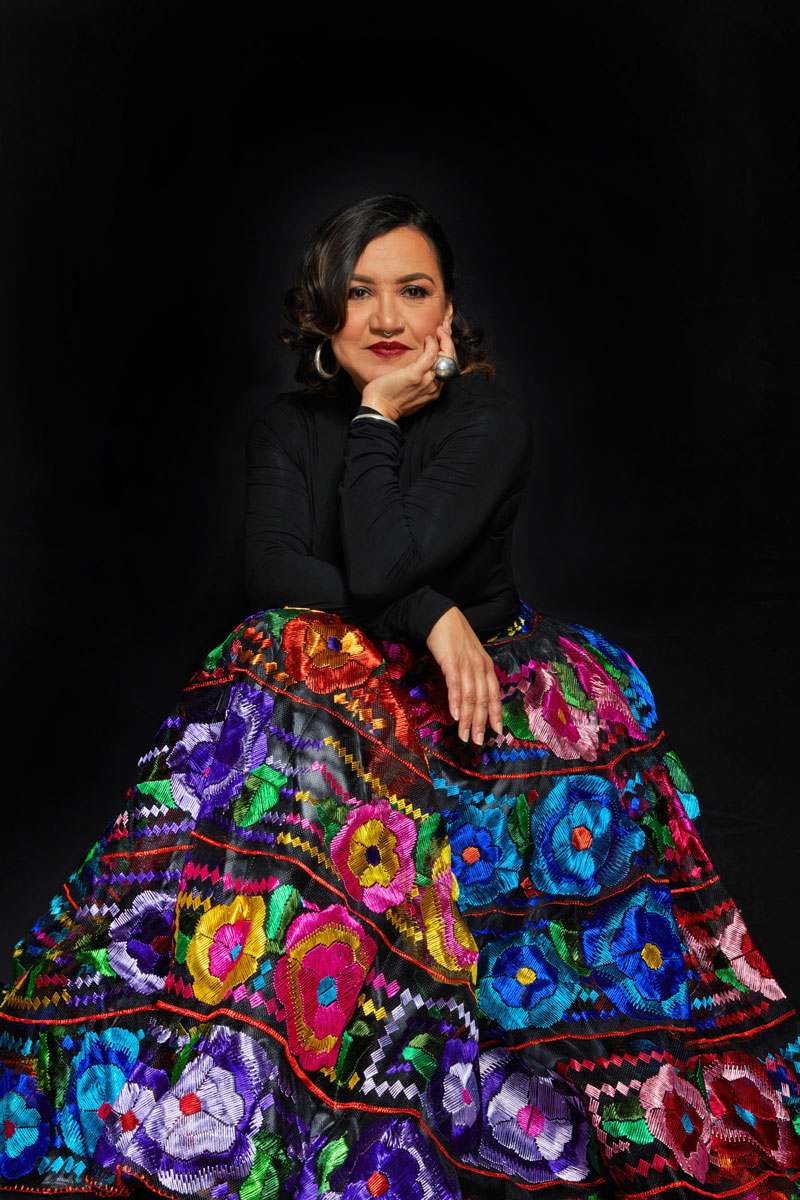 20. Martha Gonzalez, ’13
20. Martha Gonzalez, ’13
Martha Gonzalez considers herself a Chicana artivista. She first appeared on the pages of Viewpoint in 2013, having just won a Grammy with her rock band Quetzal for their album “Imaginaries.” She had done this while working on her Ph.D. in the UW Department of Gender, Women and Sexuality Studies. Her dissertation explored community building among Chicana artists and activists using musical tools and social techniques and how the artist-activists imagined and re-created elements in their communities like food sovereignty, artistic networks and knowledge production. “I received the best mentorship at the UW that a student can ask for,” she said. “All of the professors are prolific, and my adviser, Michelle Habell-Pallán, continues to be a godsend in my life.”
Today: Gonzalez continues to innovate and explore. In 2020, she published “Chican@ Artivistas: Music, Community, and Transborder Tactics in East Los Angeles,” a book blending her own story with history and social commentary. Joining the faculty of Scripps College in 2013, she is now an associate professor in the Department of Chicana/o Latina/o Studies. She continues to make music with Quetzal. Their recordings include “Puentes Sonoros” (2021) and “The Eternal Getdown” (2017).
This winter, Gonzalez returns to Seattle for the UW Public Lecture series. “An Evening with Martha Gonzalez” will be held at Town Hall on January 22. Registration opens December 12.
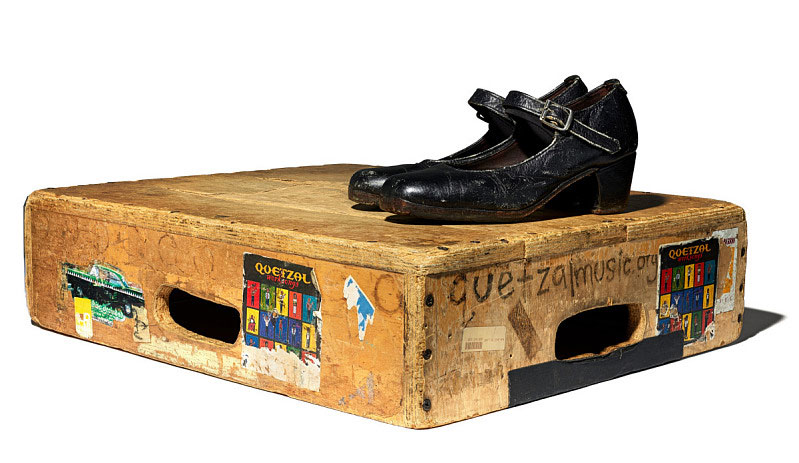
Martha Gonzalez gave the National Museum of American History her plywood stomp box, called a tarima, and her shoes from her performances with her band, Quetzal.
